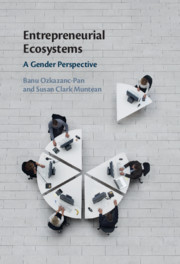Book contents
- Entrepreneurial Ecosystems
- Entrepreneurial Ecosystems
- Copyright page
- Contents
- Tables
- Preface
- 1 Introduction
- 2 Entrepreneurial Ecosystems
- 3 Understanding Gender and Inclusion in Entrepreneurial Ecosystems
- 4 Individual-Level Dynamics
- 5 Organizational-Level Dynamics
- 6 Gendering Institutions and Institutional Analysis
- 7 Intersectional Analysis
- 8 Holistic Solutions for Inclusive Economic Development through Entrepreneurship
- Index
- References
7 - Intersectional Analysis
Gender, Race, and Immigrant Status in Entrepreneurial Ecosystems
Published online by Cambridge University Press: 20 October 2021
- Entrepreneurial Ecosystems
- Entrepreneurial Ecosystems
- Copyright page
- Contents
- Tables
- Preface
- 1 Introduction
- 2 Entrepreneurial Ecosystems
- 3 Understanding Gender and Inclusion in Entrepreneurial Ecosystems
- 4 Individual-Level Dynamics
- 5 Organizational-Level Dynamics
- 6 Gendering Institutions and Institutional Analysis
- 7 Intersectional Analysis
- 8 Holistic Solutions for Inclusive Economic Development through Entrepreneurship
- Index
- References
Summary
This chapter focuses on the city of Boston and delves into how intersectional differences among women entrepreneurs result in additional and different biasing forces for women of color and immigrant women entrepreneurs compared to White women engaging in entrepreneurship. As such, the chapter provides a holistic consideration of how gender, race, and other relations of difference may play out in experiences of entrepreneurship within entrepreneurial ecosystems. The chapter aims to provide a complex and holistic picture of how entrepreneurial ecosystems essentially provide very different experiences, interactions, and institutional support for actors in ecosystems, thereby supporting our argument that actors, even if in the same category, are indeed heterogeneous and not homogeneous.
- Type
- Chapter
- Information
- Entrepreneurial EcosystemsA Gender Perspective, pp. 184 - 218Publisher: Cambridge University PressPrint publication year: 2021

